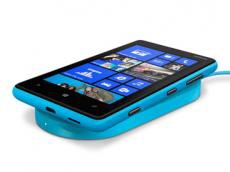|
|
TODAY.AZ / Weird / Interesting
TV,radio become charge source for Nokia phones
28 March 2013 [14:27] - TODAY.AZ
 Researchers at the Nokia Research Centre in Cambridge in the UK are working hard on a technology that can harvest small amounts of energy from ambient radio and TV waves. The cell phone would pick up radio wave frequencies as low as 500 megahertz up to 10 gigahertz, which includes television broadcasts, microwave ovens, mobile phones, wireless LAN, bluetooth, GPS, and two-way radios. In theory, two circuits would be capable of receiving and then converting the free energy to an electrical current to charge the battery of a cell phone.
Researchers at the Nokia Research Centre in Cambridge in the UK are working hard on a technology that can harvest small amounts of energy from ambient radio and TV waves. The cell phone would pick up radio wave frequencies as low as 500 megahertz up to 10 gigahertz, which includes television broadcasts, microwave ovens, mobile phones, wireless LAN, bluetooth, GPS, and two-way radios. In theory, two circuits would be capable of receiving and then converting the free energy to an electrical current to charge the battery of a cell phone.Hopefully, it would be enough energy to keep the phone charged in standby mode; although at first it won’t be enough to charge the phone while in use, or to full battery capacity. Markku Rouvala, one of the researchers who developed the device, says “trick here is to ensure that these circuits use less power than is being received.” So far, their device can collect up to 5 milliwatts of power, and their short term goal is to collect 20 milliwatts of power, which is just enough to keep the phone charged in standby mode. Ultimately, 50 milliwatts of power would be ideal and could help slowly recharge the battery.
This technology could be applied to other electronic equipment as well. Radio waves could be used to charge MP3 players, handheld devices, Kindles, portable game players, etc. Nokia isn’t relying on this type of technology alone to power their phones, they are also looking at integrated solar cells to work in conjunction with this new development. Deployment of this feature in Nokia phones is still at least 3 years away. We’ll be standing by with our waning cell phones waiting for word.
/AzerTAc/
URL: http://www.today.az/news/interesting/120695.html
 Print version
Print version
Views: 1804
Connect with us. Get latest news and updates.
See Also
- 19 February 2025 [22:20]
Visa and Mastercard can return to Russia, but with restrictions - 05 February 2025 [19:41]
Japan plans to negotiate with Trump to increase LNG imports from United States - 23 January 2025 [23:20]
Dubai once again named cleanest city in the world - 06 December 2024 [22:20]
Are scented candles harmful to health? - 23 November 2024 [14:11]
Magnitude 4.5 earthquake hits Azerbaijan's Lachin - 20 November 2024 [23:30]
Launch vehicle with prototype of Starship made its sixth test flight - 27 October 2024 [09:00]
Fuel prices expected to rise in Sweden - 24 October 2024 [19:14]
Turkiye strikes terror targets in Iraq and Syria - 23 October 2024 [23:46]
Kazakhstan supplied almost entire volume of oil planned for 2024 to Germany in 9 months - 23 October 2024 [22:17]
Taiwan reported passage of Chinese Navy aircraft carrier near island
Most Popular
 What von der Leyen doesn't know about. Or doesn't want to know
What von der Leyen doesn't know about. Or doesn't want to know
 Armenia’s “Crossroads of Peace” lacks substance to deliver regional integration
Armenia’s “Crossroads of Peace” lacks substance to deliver regional integration
 Chinese Mainland urges Taiwan businesses to jointly resist external risks, challenges
Chinese Mainland urges Taiwan businesses to jointly resist external risks, challenges
 Turkish auto sector shifts gears for green transformation
Turkish auto sector shifts gears for green transformation
 Kazakhstan intends to deepen cooperation with Afghanistan and sent humanitarian aid to Kabul
Kazakhstan intends to deepen cooperation with Afghanistan and sent humanitarian aid to Kabul
 EVs could raise carbon emissions without clean energy, international study finds
EVs could raise carbon emissions without clean energy, international study finds
 South Korea conduct large-scale night exercises on border with DPRK
South Korea conduct large-scale night exercises on border with DPRK
